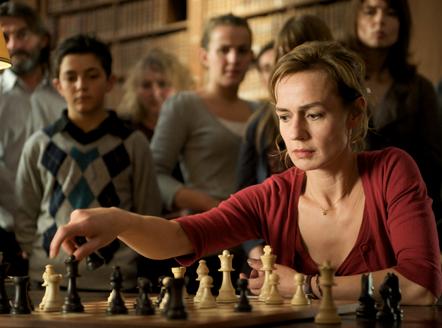Review: Queen to Play

Like the thoughtful, strategy-driven game of chess that is its focus, Queen to Play (Joueuse) is not for the impatient.
A study in parallels between chess and the larger game of life, this quiet French film is many things -- sophisticated, insightful, mildly funny and generally pleasant. One thing it may not be: captivating enough to hold most viewers' interest.
Which is not to say Queen to Play is a bad movie; to the contrary, it has many hallmarks of intelligent, competent filmmaking, with a believable story, great and sometimes surprising character development, and fine acting. And its pacing arguably is appropriate for its subject matter. But depending on your tolerance for slow-paced films -- and mine is quite high -- these attributes may or may not save Queen to Play from being rather dull. I'm still undecided.
Set on the picturesque island of Corsica, Queen to Play is the story of Hélène (Sandrine Bonnaire), a middle-aged chambermaid whose boring job and marital frustration leave her longing for a more meaningful, happier life. She develops a new interest in chess (actually, it's more of an obsession); to improve her skills, she asks for help from one of her employers, grumpy American expat Kröger (Kevin Kline).
As Hélène and Kröger spend hours together playing chess, tongues soon begin to wag in their close-knit village. Although their relationship is fundamentally intellectual -- there is also more than a little loneliness involved -- smaller minds than theirs assume their frequent tête-à-tête interludes are entirely sexual. As Hélène focuses on her chess game and loses herself in visions of a more exciting life, all else in her life begins to fall apart. Her loving but obliviously sexist husband, Ange (Francis Renaud) is understandably suspicious, and her other employer, hotel owner Maria (Valérie Lagrange), is increasingly unhappy with Hélène's absentminded mistakes. However, they eventually empathize with Hélène's interest in chess and become very supportive; it's obvious that Hélène isn't the only one leading a life of boredom.
On the surface, Hélène's chess playing is simply an intellectual exercise; on a more fundamental level, it's a means to better herself and escape from her dreary existence. The essential dramatic device in Queen to Play involves hopes and dreams battling classism and sexism: Hélène longs for the respect due any great chess player, but earning this respect is difficult for someone whom the world sees only as a simple small-town chambermaid. (In a pivotal scene, Hélène tries to enter a chess tournament with no proof of her skills. The elitist chess club president, snootily played by Daniel Martin, humiliates her by offering her a housecleaning job.)
Again, all this drama and social commentary happens at a less than breathless pace. Queen to Play is a textbook exercise in methodical storytelling, demanding that we wait for its plot to unfold. Happily, the wait usually is worthwhile. Queen to Play is a film of great nuance and ideas, including the intriguing notion that a winning strategy in chess (do not build your game too quickly; it just provokes your opponents to build theirs also) also can be a winning strategy in life. Despite a few clichéd, slightly chick-flicky missteps (a few plot points are entirely predictable), there is much to savor and reflect on here, all luxuriously lensed against Corsica's stunning backdrops.
Bonnaire perfectly embodies Hélène, a woman aging gracefully while suffering existentially. Like almost everything in Queen to Play, her performance is low key, her frustration simmering rather than raging. She need not yell; the hurt on her face tells us all we need to know. Although Queen to Play isn't a romance in the conventional sense, Bonnaire's Hélène most definitely is a romantic figure, dreaming soft-focus dreams of a life better lived.
Kline also shines in his first French-speaking role, transforming the arrogant, curmudgeonly, reclusive Kröger -- who initially can't be bothered to remember Hélène's name -- into a far more sympathetic (if no less reclusive) mentor and friend. Like many characters in Queen to Play, Kröger hides his long-festering angst under layers of distance and cynicism, and only a seasoned actor like Kline could make his emotional reawakening feel so natural and his renewed sense of hope so convincing.
There is enough to like about Queen to Play that I wish I could recommend it without hesitation. But its slightly bland tone and unhurried tempo, along with a few unnecessary scenes that further slow its progression, can make the movie a challenge to watch. Like a well played game of chess, however, it does reward those who are willing to wait.

